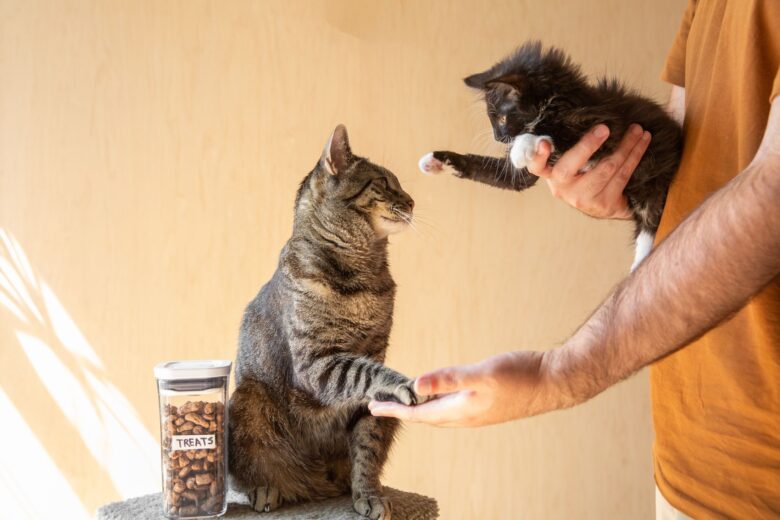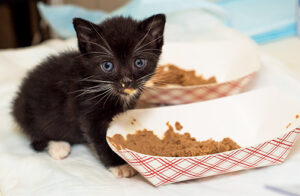The first few weeks of a kitten’s life are very important because they determine its behavior as an adult. Early care for a kitten involves many things, such as socialization, nutrition, health, and exposure to the world. All of these things can have a significant impact on your cat’s future behavior.
Socialization: Developing a Behavior Plan
Socialization is the process by which kittens learn how to bond with people, other animals and different environments. Between two and seven weeks is a very important period of interaction. By gaining good experiences during this period, your cat can grow into a well-adjusted, friendly adult. Kittens who are treated gently by people, bond with other animals and live in different environments are more likely to become confident as adults and less afraid of new things.
On the other hand, if a kitten does not interact with other animals early on, it may develop behavioral problems such as nervousness, aggression or shyness. They may react more strongly to new people or situations and show signs of anxiety or avoidance.
Nutrition: Important Part of Healthy Growth
During the kitten stage, a good diet is essential for both physical and mental growth. If cats don’t get enough or the right amount of nutrients, they can develop health problems that change their behavior. For example, a cat that doesn’t get enough food may become cranky or lazy. A healthy, balanced diet rich in important nutrients helps cats’ brain development, making them smarter and better able to learn and change as adults.
The Role of Early Experiences in Long-Term Behavior:
Vaccinations, deworming, and regular checkups are all important parts of a kitten’s early care and can help protect her from diseases that affect her behavior and growth. Illness or chronic pain in kittens can cause stress if left untreated, and stress in adult cats can manifest as aggression or withdrawal. If kittens receive early veterinary care and regular checkups, they are more likely to grow up to be healthy adults with fewer behavioral problems.
Environmental Enrichment: Changing the Way Adult Cats See the World
Where a kitten grows up has a major influence on how it behaves as an adult. Giving cats more places to play, explore and connect can help them become more curious and better able to adapt to new environments. Toys, scratching posts and safe, supervised outdoor activities can keep kittens’ minds active and help prevent future behavioral problems such as violence or boredom.
However, when adult cats live in places that are stressful or lack resources, they can exhibit a variety of behavioral problems, such as fear, aggression and anxiety. To have a well-balanced adult cat, you need to make sure he has a safe and interesting place to live.
How Early Experiences Influence Behavior Over Time:
Both positive and negative experiences they had as children can have an impact on cats’ behavior. Good interactions and experiences can help you trust others and feel less afraid in new situations. Side effects such as trauma, abuse or neglect can lead to long-term behavioral problems such as anxiety, aggression or problems making friends.
To encourage healthy behavioral development, it is important to provide kittens with a stable, loving and stimulating environment. Kittens learn to adapt through exposure to different things, such as people, animals, sounds and the environment. These skills will help them as adults.
Training and Habituation: Setting the Stage for Good Behavior
Cats can avoid many behavioral problems as adults by being trained and habituated at a young age. By using litter boxes, scratching posts and gentle petting, kittens can develop good habits that will last into adulthood. When adult cats get used to new things, such as car rides, vet visits and grooming, they can better cope with the stress and worry that come with them.
The Influence of Genetics and Personality:
Although care and activity are important in the early months, a kitten’s genes and personality also have a major influence on his or her behavior as an adult. Genetics can influence certain traits, such as how friendly, angry or anxious a person is. Understanding and adapting to each kitten’s unique characteristics and habits can help you provide them with specialized care that improves their health and behavior.
Early Care and Lifelong Effects:
The immediate health and behavior of kittens are influenced by the care and experiences they receive, and by their behavior as adults. Early, consistent and good care can help cats become confident, friendly and well-adjusted. Kittens need to live in a caring environment that supports their physical and mental health and allows them to adjust their behavior when necessary.
Conclusion:
To sum up, caring for kittens early on has a big and complex effect on how cats act as adults. A complete method of kitten care that includes proper socialization, nutrition, medical care, outdoor enrichment, and training can have a big impact on the development of good behavior in adult cats. Cat owners and caregivers can help their feline friends grow up to be healthy, happy, and well-behaved adult cats by spending time and effort on their early care. This will help the cats form a lifelong bond of friendship and mutual respect.
FAQs:
1. Why is the time for cats to meet new people important?
Kittens need to be socialized between the ages of 2 and 7 weeks. This is when they learn how to connect with their surroundings, such as people, other animals, and different stimuli. Having good experiences during this time is very important for making a cat that is well-adjusted, friendly, and sure of itself as an adult.
2. How does being around people change a kitten’s behavior as it gets older?
Kittens get more comfortable and friendly with people when they have regular, gentle interactions with people, like being held, petted, and played with. This early contact with people has a big effect on how friendly and trusting they are of people as adults.
3. Can where a kitten grows up affect how it acts as an adult?
Yes, a kitten’s setting does have a big effect on how it acts as an adult. Cats that are introduced to a lot of different sights, sounds, and experiences as kittens are more likely to be able to handle new situations well as adults.
4. How important are food and medical care for a kitten when it is young?
In the first few months of its life, a kitten needs to eat right and get medical care. These things help it grow and develop normally and can prevent health and behavior problems in the future. If a kitten doesn’t get enough food or has health problems, it can affect the cat’s behavior and health in the long run.
5. What changes a kitten’s behavior after a traumatic event or bad experience?
Trauma or bad experiences as a kitten, like being abused, neglected, or very sick, can cause long-lasting behavior problems in adult cats, like fear, anger, and anxiety. These results show how important it is to give kittens a safe, caring, and happy place to live.



